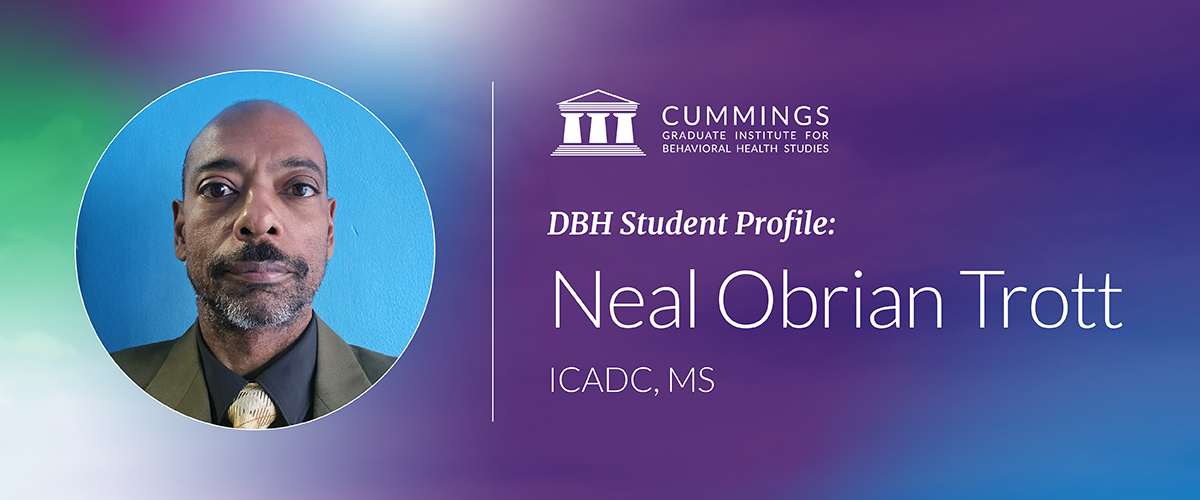 Integrating Hope: Neal Obrian Trott’s Journey Toward Transforming Addiction Care Through Integrated Leadership
Integrating Hope: Neal Obrian Trott’s Journey Toward Transforming Addiction Care Through Integrated Leadership
Neal Obrian Trott, ICADC, MS, is a Bermudian addiction counselor and current Doctor of Behavioral Health (DBH) student at Cummings Graduate Institute for Behavioral Health Studies. A first-generation university student, Neal began his professional career in engineering before discovering his true calling in behavioral health—where he now dedicates himself to supporting individuals impacted by addiction. A passionate lifelong learner, Neal combines clinical expertise with lived experience to guide his work in substance use recovery. Outside of his professional life, he enjoys reading, running half-marathons, and playing the piano—a creative pursuit he looks forward to exploring more deeply in retirement. Neal leads a quiet, purposeful life grounded in reflection and is energized by opportunities to experience the world through travel. In this interview, he shares key moments from his DBH journey, discusses his professional goals, and reflects on what drew him to the DBH program.
How will the DBH program transform your understanding of behavioral health, and in what ways will it influence your career trajectory?
The DBH program tasks and assignments constantly challenge me to move beyond my comfort zones and explore new ideas and ways of doing things. Challenging the mindset that relies on traditional ways of doing things has resulted in widespread dissatisfaction but with no solutions on offer and it is easy to remain in this comfort zone. The objective of the DBH program at CGI is always to improve healthcare delivery and the skillsets practiced and developed are extensive and multidisciplinary. Studying the research and applying it to my particular work environment empowers me to be an agent for change. I can bring a holistic, integrated approach to problems that results in innovative and effective solutions making me more valuable because my approach to behavioral health draws on a multidisciplinary body of knowledge.
What are innovative approaches or strategies you believe can revolutionize the behavioral health landscape?
The approach that is fundamentally different is to approach a problem from a holistic multidisciplinary perspective. This is a struggle because many people chose careers to master the orientation and practice of that discipline. Developing individuals or becoming an individual that inherently draws on multiple disciplines to solve a problem is unique and promises to offer more incisive, efficient solutions to problems. Therefore, the strategy of approach to problems from an integrated perspective will allow the nuances of particular cases to stand out and be addressed more effectively.
What specific insights or skills do you hope to gain through the DBH that will be instrumental in your professional development?
I expect to gain the ability to speak to healthcare administrative, medical, and clinical professionals in their own language. I will be able to frame solutions that include objectives that resonate with the professional standards that they are trained to uphold. Without multidisciplinary training, professionals will understandably think that they could not accept an outsider’s judgements. Having the ability to speak in the language of professionals outside of my primary training will enable my perspectives to be respected and move any issue toward a positive outcome.
What are your future career goals within the behavioral health sector and how do you envision the DBH program contributing to your success?
I plan to lead through promoting integration among the agencies that my organization is affiliated with. Most addictions counselors are content to have a small range of influence. I want to be invited into wider discussions of policy and treatment protocols. I want to be empowered to act in administrative and organizational capacities because of the quality of my input. I believe the professional approach that I require will be instilled in me through the DBH program at CGI.
How has the DBH program equipped you for leadership roles?
Leadership is critical to advancing behavioral health, and the fundamental question is how to achieve this leadership role? I believe the DBH program at CGI is a training ground that fosters leadership as a natural consequence of the effort put into accomplishing the objectives for each class. Simultaneously, as a working professional my skills are constantly being upgraded as I implement my new skills daily. Thus, by becoming a DBH graduate, I will be a leader.
How do you see yourself making a lasting impact in behavioral health?
My clients’ success is one way that my impact will last. This is the fundamental goal that I wish to achieve. Secondly, my organization will have standards and protocols that are directly resulting from my input which will stand the test of time because they are grounded in solid scientific research.
Neal Obrian Trott is redefining what it means to lead in behavioral health. As a first-generation university graduate and current Doctor of Behavioral Health (DBH) student, Neal brings a rare combination of technical precision, clinical insight, and personal empathy to his work in addiction counseling. His dedication to breaking out of traditional silos and embracing multidisciplinary collaboration positions him as a future leader in integrated behavioral health. With each step of his DBH journey, Neal is shaping a legacy rooted that empowers individuals, strengthens systems, and challenges the status quo in pursuit of better care for all.






























